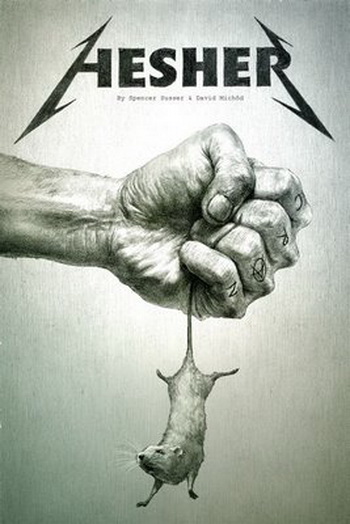 He’s crude, mysterious, and downright dangerous. He’s Hesher. The cursing, stomping, intimidating character starring in the film of the same name, played by Joseph Gordon Levitt, dominates the screen. Hesher is an unusual character that comes complete with his own heavy metal song cues and explosives. There is nothing like spending an evening watching a guy with stick figure tattoos and an affinity for destruction moving in on a junior high school kid’s messed up life.
He’s crude, mysterious, and downright dangerous. He’s Hesher. The cursing, stomping, intimidating character starring in the film of the same name, played by Joseph Gordon Levitt, dominates the screen. Hesher is an unusual character that comes complete with his own heavy metal song cues and explosives. There is nothing like spending an evening watching a guy with stick figure tattoos and an affinity for destruction moving in on a junior high school kid’s messed up life.
“Hesher†focuses in on a narrow audience of young males who love metal music and revel in the crudeness and disregard of the title character. Regardless, the film could be enjoyable at times for any audience because of its unabashed personality, as it combines the fantastical and unpredictable character of Hesher with the realism of T.J.’s life and heavy situation.
Where the two characters will end up is anyone’s guess at the beginning of this film.
Hesher may be the title character, but T.J., played by newcomer Devin Brochu (“In the Valley of Elahâ€), is the focal point of the flick. Through the first half of the film T.J. gets beat on emotionally and physically by everyone from the school bully and Hesher, to his family. He is junior high school aged and he has no one to rely on, pedaling his way to and from school on his well-worn bike and coming and going without much notice from his basket-case father (played by Rainn Wilson). What’s pleasantly appealing is that the older-brother figure of Hesher steps into T.J.’s life and doesn’t play the hero role, but instead is just another complication.
Along with invading the life of T.J., Hesher does whatever he wants, whenever he wants, to whomever he wants. Some of the endeavors he drags T.J. on include trespassing, destroying private property and arson. But still, he has a charm that catches the eye of T.J.’s grandmother and hopeless supermarket check out girl Nicole, played by Natalie Portman. Portman’s lackluster performance mimics her character’s life as a frustrated and broke cashier, but she serves her purpose adding some female flavor to the film as well as an added bone of contention between T.J. and Hesher.
Aside from the obvious connotation of young T.J.’s lack of control over his life, allowing his father to ignore his existence and the school bully to torture his life, Hesher is a character all his own. Levitt plays the part in a convincingly mature way (if you’ve ever known anyone remotely like this character, you will appreciate the authenticity) and will have you laughing as he joins T.J. and his family at the dinner table, and surprisingly is the most well-mannered one there. Levitt is the centerpiece here, and elevates all the other performances, as you can see he thoroughly enjoyed playing this wacky character.
Even though Hesher is the title character, the heart of the film concentrates on T.J. and his father, and we begin to understand the deep depression and hurt the two characters feel as they weakly participate in a grieving group and their relationship at home hangs by a thread. The conclusion will move you, and Hesher’s unorthodox and hilarious speech is fun to watch because T.J. and his father are visibly uncomfortable. Hesher pushes T.J. to the edge, but sometimes in life we need that- as clearly the two characters of T.J. and his father exhibit in their ‘life is in shambles’ situation.
Like the entire film, the conclusion seems outlandish, but is closer to reality than some of the “based on a true story†flicks. Hesher’s unapologetic actions and unfiltered words mimic many confused post-high school kids, and T.J.’s verbally challenged junior high demeanor is truthful and painful to watch as it is to live through that age. Basically, if you could learn to loosen up enough, you can appreciate the fun of “Hesher†and the truth behind the inventive characters.

Leave a Reply